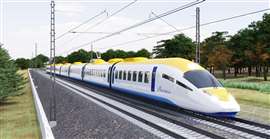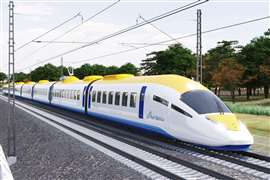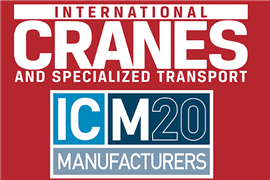Read this article in 中文 Français Deutsch Italiano Português Español
Facing €19bn deficit, is Rail Baltica megaproject doomed?
14 June 2024
The National Audit Office of three European countries – Estonia, Latvia, and Lithuania – released a joint audit report and press statement which cast doubt on the financial feasibility of the planned Rail Baltica cross-country railway, saying the originally projected cost has increased ‘fourfold’ in seven years, and could cause a deficit between €10 to €19 billion (US$11 to 20 billion).
 Digital render of a Rail Baltica train (Image: Rail Baltica)
Digital render of a Rail Baltica train (Image: Rail Baltica)
The report said a two-year financing gap expected in 2027-28 by the European Union “aggravated” the situation, which would require contributions from the three countries to offset.
“According to the estimates of the three Supreme Audit Institutions, an additional €19 billion is needed to complete the Rail Baltica project in full,” said the joint report. “Considering the latest project budgets in each country and the already allocated funds, in Estonia €2.7 billion is needed, in Latvia €7.6 billion, and in Lithuania €8.7 billion.”
In blunt terms, the report said project completion at its current scope is not a certainty, and maybe even unlikely.
“The on-time financing is at risk not only because the estimated costs have increased, but also because the current European Union funding period ends in 2027,” explained the auditors. “As the next funding period will begin in 2028, there will probably be a gap in financing for the years 2027-2028.”
The Rail Baltica project seeks to integrate the Baltic states into the European rail network along an 870km line running from Helsinki in Finland and Tallinn in Estonia in the north, to Warsaw in Poland further south. A consortium of Eiffage, Budimex, and Rizzani de Eccher won a nearly €4 billion contract in May for a 230km-section of line.
Within their borders, as part of the original plan, Estonia would see 213km of rail construction, Latvia 265km, and Lithuania 392km.
Reducing the scope of Rail Baltica
To avoid a financial conundrum, the trio of Baltic governments are likely to agree to a reduced scope for the Rail Baltica project.
“To manage the increased budget and strict deadline to make the railway operational by 2030, the Governments of Estonia, Latvia and Lithuania are preparing to reduce the scope of the work to be done by 2030 and have set the focus on building the mainline of the railway,” said the report. “The scope reduction (the first phase) means that local stops will be either built to minimal functionality or built later, and only one set of tracks will be built instead of two in some parts of the railway.”
Altogether, the auditors said reducing the scope could save the three countries €10 billion. They added that they were not counting on any funding from the Connecting Europe Facility programme, which was the main tool financing the project.
Added to the financial problems, the project is already about five years behind schedule.
“The railway was planned to be built and ready to operate by the end of 2025,” said the audit report. “The general delay is caused mainly by consecutive delays in the design and territorial planning processes, which both also affect land acquisition progress.”
Even if the first phase of the project is completed by 2030, the auditors said there’s a risk trains wouldn’t be able to operate until the following year.
“It should be acknowledged that the cost of acquiring the trains as well as maintaining and operating the project is not included in the project’s budget and cannot be financed from European Union funds,” said the auditors.
Rail Baltica’s response
Responding to the report, Rail Baltica said that the project had “evolved significantly” since its 2017 cost-benefit analysis as a result of 40% inflation in the Baltic states between 2017 and 2022, scope expansion and more accurate data.
It claimed that the economic benefits of the project would surpass costs, at a total of €48 billion for the Baltic states and that it is seeking “diverse financial sources” including private investment and loans, contingent on the next EU budget.
Breaking down the cost rises, it attributed 31% of the increase to higher cost preductions due to scope project increase between 2017 and 2023, which included additional regional mobility connections, changes in technical standards, and enhancements in safety and performance.
More than half of the rise (51%) was due to more accurate data for costs due to design advancements, and 18% was due to “additional external requirements and factors”, institutional technical regulations, interoperability technical specifications and other changes.
Taking 40% inflation into account, the cost drivers would add 19% for scope changes, 30% for contingencies and design advancement and 11% for additional external requirements, it said.
Rail Baltica added that risk and change management are “integral to project management”.
It also highlighted the importance of the project in the shadow of the war in Ukraine, adding, “Since 24 February 2022 , the necessity for a well-connected Europe has become more apparent than ever. Rail Baltica, traditionally discussed in terms of passenger and freight transport, is now recognized as crucial for military mobility on NATO’s eastern flank, especially in light of the current geopolitical situation. According to the published report by the Supreme Audit Institutions (SAIs) of Estonia, Latvia, and Lithuania, Rail Baltica delivery organizations, along with all those involved in Rail Baltica construction, continue to cooperate, seeking to find and implement optimal solutions for completing this rail connection in the most cost-efficient manner, meeting all agreed interoperability parameters, and within the shortest possible timeframe.”
STAY CONNECTED


Receive the information you need when you need it through our world-leading magazines, newsletters and daily briefings.
CONNECT WITH THE TEAM











